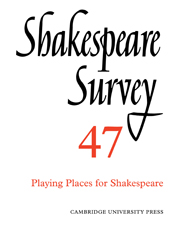Book contents
- Frontmatter
- Shakespeare Played Small: Three Speculations about the Body
- The Architecture of the Fortune Playhouse
- The Bare Island
- ‘How Chances it they Travel?’ Provincial Touring, Playing Places, and the King’s Men
- Writing for the Metropolis: Illegitimate Performances of Shakespeare in Early Nineteenth-Century London
- The Perishable Body of the Unpoetic: A. C. Bradley Performs Othello
- Playing Places for Shakespeare: The Maddermarket Theatre, Norwich
- ‘A Fairly Average Sort of Place’: Shakespeare in Northampton, 1927–1987
- The Living Monument: Self and Stage in the Criticism and Scholarship of M. C. Bradbrook
- Stratford Stages: Interviews with Michael Reardon and Tim Furby, and Sam Mendes
- Dis-Covering the Female Body: Erotic Exploration in Elizabethan Poetry
- Theseus’ Shadows in A Midsummer Night’s Dream
- ‘Time for Such a Word’: Verbal Echoing in Macbeth
- Shakespeare’s Knowledge of Italian
- Tamburline and Edward Alleyn’s Ring
- Shakespeare Performances in England, 1992–1993
- Professional Shakespeare Productions in the British Isles, January-December 1992
- The Year's Contributions to Shakespeare Studies 1 Critical Studies
- 2 Shakespeare’s Life, Times, and Stage
- 3 Editions and Textual Studies
- Books Received
- Index
Writing for the Metropolis: Illegitimate Performances of Shakespeare in Early Nineteenth-Century London
Published online by Cambridge University Press: 28 March 2007
- Frontmatter
- Shakespeare Played Small: Three Speculations about the Body
- The Architecture of the Fortune Playhouse
- The Bare Island
- ‘How Chances it they Travel?’ Provincial Touring, Playing Places, and the King’s Men
- Writing for the Metropolis: Illegitimate Performances of Shakespeare in Early Nineteenth-Century London
- The Perishable Body of the Unpoetic: A. C. Bradley Performs Othello
- Playing Places for Shakespeare: The Maddermarket Theatre, Norwich
- ‘A Fairly Average Sort of Place’: Shakespeare in Northampton, 1927–1987
- The Living Monument: Self and Stage in the Criticism and Scholarship of M. C. Bradbrook
- Stratford Stages: Interviews with Michael Reardon and Tim Furby, and Sam Mendes
- Dis-Covering the Female Body: Erotic Exploration in Elizabethan Poetry
- Theseus’ Shadows in A Midsummer Night’s Dream
- ‘Time for Such a Word’: Verbal Echoing in Macbeth
- Shakespeare’s Knowledge of Italian
- Tamburline and Edward Alleyn’s Ring
- Shakespeare Performances in England, 1992–1993
- Professional Shakespeare Productions in the British Isles, January-December 1992
- The Year's Contributions to Shakespeare Studies 1 Critical Studies
- 2 Shakespeare’s Life, Times, and Stage
- 3 Editions and Textual Studies
- Books Received
- Index
Summary
“A kingdom for a stage, princes to act, / And monarchs to behold the swelling scene.” Such was Shakespeare's description of the theatrical space in which he wished his plays to be performed. Or rather, so Thomas Morton, a reader of plays at Drury Lane, sought to defend the existing system of dramatic regulation in nineteenth-century London. Shakespeare's plays, he claimed, should be performed 'only in the noblest temples of the Muses'.
Until 1843, theatrical legislation permitted only Drury Lane and Covent Garden (the 'patent' theatres) to perform Shakespeare within the metropolis. This article discusses certain 'illegitimate' performances of Shakespeare which took place at the London 'minor' playhouses. These establishments included the Royal Circus/Surrey in Southwark, the theatre in Tottenham Street, the Pavilion and Garrick theatres in Whitechapel, and perhaps most importantly, the Coburg theatre, now the Old Vic. Often converted from other non-cultural uses - an old clothes factory, a shop or a disused chapel - these new playhouses attracted not only the local gentry, but also petit bourgeois and artisan spectators: butchers, shopkeepers, sugar bakers, tailors and mechanics as well as hackney coachmen, sweeps and dustmen.
The commercial survival of local playhouses depended on their ability to target the interests of spectators from the neighbourhood. Nevertheless, managers also wished to encourage the lucrative patronage of genteel theatre-goers from Westminster. What deterred such spectators were the unrespectable neighbourhoods in which the minor theatres were often situated, and the 'vulgar' social constituencies which attended them.
- Type
- Chapter
- Information
- Shakespeare Survey , pp. 61 - 70Publisher: Cambridge University PressPrint publication year: 1994
- 3
- Cited by



